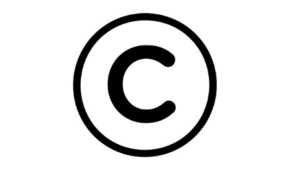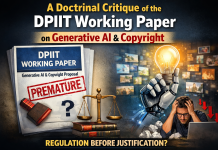(This post is co-authored by Umang Sethi, a fourth year student from Institute of law Nirma University.)
The first part of the post analyzed case and highlighted some crucial parts of the case that require further scrutiny. The present post will look at the policy implications for mandatory copyright registration and propose certain suggestions that may be taken into account while dealing with issue of mandatory copyright registration.
Continued…
Before delving into the policy implications, it will be interesting to know the countries which mandate copyright registration. Notably, most of the countries do not have registration/recordation system of copyright, however, there are some countries where the registration system provides additional benefits to the registrant (right owner) and imposes administrative sanctions. There are some countries which mandate registration of some works. Turkey mandates Copyright registration for cinematograph and phonograms. In South Africa, it is only cinematograph films that are registered. In USA, copyright registration is voluntary. In Austria and Germany, registration has some added benefits for published anonymous and pseudonymous works (term of protection runs from the death of the author instead from the first publication.). In Bulgaria, Kingdom of Saudi Arabia, Peru Romania, and Argentina, a publisher is required to register a published national work. In Mali, Mongolia, and Mauritius, registration is required to initiate judicial proceedings. Similarly, in Nepal, registration is mandatory for national works in order to institute legal action. Similar is system in USA, which gives extra benefits for the registration such as statutory damages, attorney fees etc. In Argentina, the lack of registration of published national works results a fine and the suspension of the patrimonial right of reproduction. Thus, regardless of mandatory copyright registration, countries do incentivize its people to register copyright. (read more here)
Coming to the Case
In Sanjay Soya, while holding copyright registration as voluntary, the Court made one interesting reference about the ‘knowledge’ aspect of infringement. The Court noted that “Every forger, plagiarist or, to use a more colloquial expression, ‘rip-off artist’ knows what he or she is about, i.e., forging, plagiarising, or ripping off’ another’s original work, even as he or she goes about doing it said.”
Such generalization of copyright infringement is both conceptually and practically wrong. If this was conceptually true, there would not arise the question of subconscious copying wherein people do not know that they are copying someone’s work. Also, this cannot be practically true because there is no system to check the origin of the work (simply because copyright registration is not compulsory). Copyright infringement is not based on complete copying, rather, it’s qualitative copying. For e.g., even if a three seconds’ beat of a song is used which is an important part of the song, it would likely be a copyright infringement. There are traditions that celebrate copying for the production of new works. Sampling is one such example (not going into the details, please read here and here). The Court’ assumption that every infringer would know that she/he is copying someone’s work is based on another assumption that people have access to all the copyrighted works and it is always possible for them to check the ownership. However, in the absence of mandatory registration requirements of a work, no such mechanism exists for the people to know the origin of the work. For orphan works i.e., the works whose authors/owners are not known, the assumption of court becomes more problematic.
The primary legal justification for not mandating the copyright registration comes from Article 5 of the Berne Convention which states that “Protection must not be conditional upon compliance with any formality”. Interestingly, the Copyright Bill, 1955, contained such mandatory registration provisions as follows:
- Jurisdiction of court over matters arising under this Chapter
- Every suit or other civil proceeding arising under this Chapter in respect of the infringement of the copyright in any work or the infringement of any other right conferred by this Act shall be instituted in the district court having jurisdiction.
- No such suit or other proceeding regarding infringement of copyright in any work shall, after the commencement of this Act, be entertained unless the copyright is registered with the Registrar of Copyrights under this Act.
However, the Copyright Bill, 1956, as amended and submitted by the joint committee, removed such requirement by modifying Clause 61 (in place of the original Clause 65 of the 1955 Bill):
“61. Jurisdiction of court over matters arising under this Chapter
- Every suit or other civil proceeding arising under this Chapter in respect of the infringement of the copyright in any work or the infringement of any other right conferred by this Act shall be instituted in the district court having jurisdiction.
- For the purpose of sub-section (1), a “district court having jurisdiction” shall, notwithstanding anything contained in the Code of Civil Procedure, 1908, or any other law for the time being in force, include a district court within the local limits of whose jurisdiction, at the time of the institution of the suit or other proceeding, the person Instituting the suit or other proceeding or, where there are more than one such persons, any of them actually and voluntarily resides or carries on business or personally works for gain.”
However, this does not suggest that voluntary registration requirements are good for all. It has its problems too. Interestingly, there are some arguments which need to be taken into account while discussing the registration requirement of copyright. The first objection is that formalities of mandatory registration are incompatible with copyright regimes’ underlying philosophical and normative commitments. A natural rights-based rationale of Locke & Hegelian states that the act of creation itself is at the heart of this claim. If “copyright is born with the work,” as Ginsburg puts it, “no further state intervention should be required to confer the right; the sole relevant act is the work’s production.”
Secondly, if the registration is made mandatory it may also delimit creativity. How? It would force the creator to pay the registration fees of the literary/ artistic work, of which he is not sure about if the work will fetch him succeeding returns. Conversely, for Locke, IP is a reward for labour which enhances common stock, thus, benefiting the society and the mandatory registrations will create an artificial barrier for him to create novel works and subsequently limits creativity. In developing or least developed countries, the payment of registration for copyright may also de-incentivize people to create work, given the cost of getting registration.
The supporters, on the other hand, claim that Copyright registration is a one-time procedure. It does not need to be renewed or monitored on a regular basis by the registered owner. When a conflict occurs over who was the original creator of a work after a long period of time, registration is critical. The date of filing a Copyright claim is clearly visible on the application. If not an earlier date, this would be the undisputed date to prove that the applicant is an early creator of the work. As a result, the issue of ‘who created a work’ and ‘whether a work is original’ would be directly addressed to some extent.
Further, Registration would continue to confer evidentiary advantages, such as proof of publication, fixation (reinforced by deposit), and a rebuttable presumption that the applicant is the rights-holder (author or first owner). It would also give constructive notice to the public and defeat a defence of innocent infringement. The purpose of registration would be to improve the quality and availability of ownership information so the consequences of non-registration would be fashioned accordingly.
A Mid- Way Solution
Interestingly, Professor Dev Gangjee Dev S. Gangjee in his article, ‘Copyright Formalities: A Return to Registration?’ suggests a mid-way approach to this problem. He proposed a two tier approach as follows
“In the first phase, a period of 10 years from creation – copyright would subsist and registration would only be a necessary precondition for infringement proceedings. Registration would permit proceedings to be brought for infringing conduct taking place even prior to registration. However, this retrospective effect would be limited to injunctive relief and damages based on the actual loss suffered by the claimant. The recovery of costs/fees, gains-based damages and statutory damages (as applicable) would only be available for infringing acts which take place after registration. At the end of this period, Phase Two would commence for the duration of the copyright term. Registration would be a necessary precondition for infringement and it would only have prospective effects, opening up the full suite of remedies for infringement only taking place after registration. A strongly-incentivised recordal system would encourage up-to-date ownership information. This would facilitate a market for licenses and clearly be in the interests of copyright owners. For Phase One, defendants who were genuinely unable to identify or locate the copyright holder because they were not registered could avail of an ‘innocent infringer’ defense. Across both Phases, moral rights such as the right to attribution (where possible) or integrity would remain available regardless of registration status.”
Prima facie, Prof Gangjee’s suggestions do make a strong case and showcase need to mandate registration. This is undoubtedly an important origin check in copyright law. Additionally, it can also pre-empt illegal appropriation of traditional cultural expressions, if claimed to be original work of an author. However, in my opinion, it requires more empirical study and data before taking a policy action. Instead of addressing it as voluntary or mandatory registration, Its implementability can also be made work dependent (such as Turkey and South Africa). India may also give some additional benefits of registration and disentitle non-registrants from certain benefits.
Image source: here












